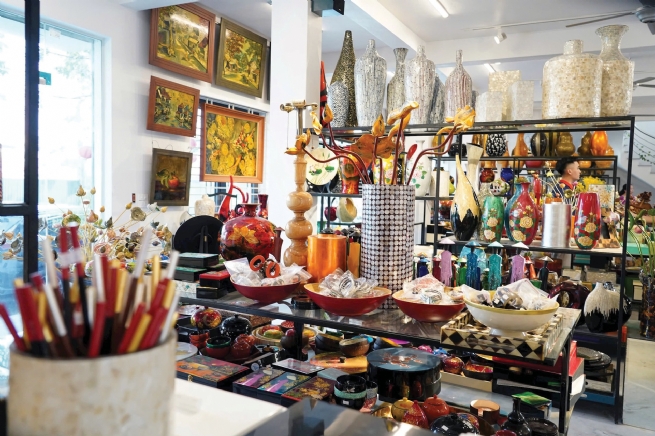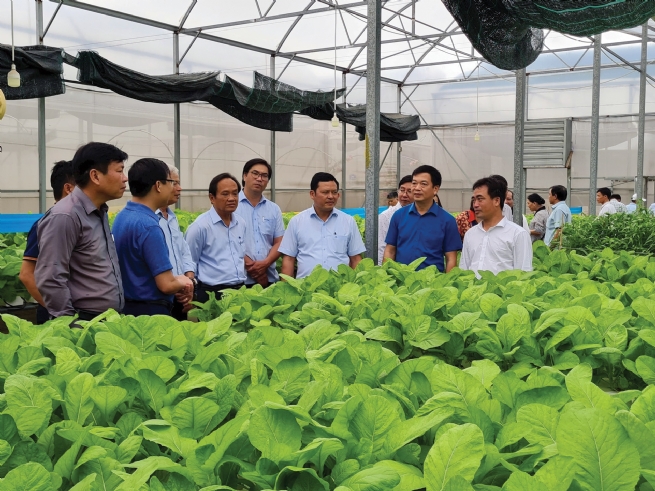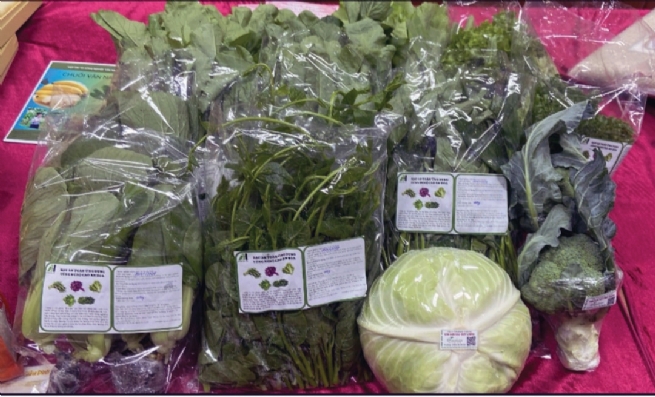9:02:11 AM | 6/10/2025
To enhance the value and market presence of competitive “One Commune, One Product” (OCOP) items, boosting local income and economic growth, Hanoi’s agricultural sector has actively guided and supported producers in ongoing research, innovation, value-added processing, and product diversification. This processing has greatly increased the value of OCOP products.

Ha Thai lacquer products feature diverse and elegant designs
According to lacquer artisans in Ha Thai lacquerware village in Thuong Tin district (Hanoi), every lacquerware - whether it is a small cup, bowl, flower vase or big items like a painting - requires meticulous, elaborate and skillful craftsmanship at every stage of production. Thai Ha villagers have developed a wide variety of lacquerware products, exported to many countries around the world, including the United Kingdom, France, Russia, the United States, Spain, Australia, Italy, Japan and South Korea. Ha Thai lacquerware is highly diversified and expanded by artisans on a wide range of materials such as bamboo, pressed paper, ceramics, eggshells, clam shells, buffalo horns, silver and gold.
According to Mr. Do Hung Chieu, Director of An Huy Trading Services and Production Joint Stock Company, creating a perfect lacquerware product requires 15 different stages, using natural lacquer, cashew lacquer, alluvial soil from the Red River, stone powder and sawdust. In particular, the base-coating process involves nine layers of lacquer, with each layer followed by polishing. This cycle of lacquering and polishing is repeated nine times to complete a product.
After the base is finished, the decorative stage depends on the design theme which may involve using eggshells, clam shells, snail shells, buffalo horns, silver or gold. When the decoration is completed, the product is coated with gloss finish lacquer twice and then polished further until it meets quality standards.
Joining the OCOP Program, Ha Thai lacquerware products have been rated 3-star and 4-star, with potential to reach 5-star recognition. Typically, two products - the mother-of-pearl inlaid lacquer box and the horn-inlaid lacquer box produced by An Huy Trading Services and Production Joint Stock Company - have been certified 4-star OCOP products by the Hanoi People's Committee.


Hanoi is advancing many high-tech vegetable cultivation models
In Long Bien district, OCOP products range from a variety of deeply processed foods such as sausages, chicken rolls, pork patties and shredded pork to organic agricultural products like organic vegetables, soaps made from guava leaves and hand sanitizers made from guava leaves. Some economic entities such as Huong Viet Sinh Co., Ltd and Tue Vien Organic Agriculture Joint Stock Company are planning to expand their production to export their products to foreign markets.
Mr. Nguyen Thanh Ha, Sales Director of Huong Viet Sinh Co., Ltd, said: In preparation for joining the OCOP Program, the company actively researched self-incubating Ho chickens and developed closed-loop pig farms to produce a wide array of deeply processed foods like salt-cured chicken, chicken rolls, pâté, sausages, lean pork rolls, stir-fried pork rolls, fatty pork rolls, shredded pork and green rice pork patties. The company operates under ISO 22000-certified quality management standards and applies Japan’s national 5S standards in its kitchen facilities. Currently, the company has 18 OCOP-certified products and supplied clean food to over 100 schools in Hanoi and targeted to export its product to Australia.
According to the Hanoi Coordination Office of the New Rural Development Program, value-added processing is an effective way to increase the value and secure the stable market for OCOP products. This approach helps local producers improve their income and contribute to local economic development. To expand the market for OCOP products, producers must continuously engage in research, innovation and investment in value-added processing, thus enhancing product quality and market competitiveness. It also offers a solution to address challenges concerning the output market for agricultural products, increase their value and boost local agricultural growth. To date, Hanoi has evaluated and rated 3,317 OCOP products, including six 5-star products, 22 potential 5-star products, 1,571 4-star products and 1,718 3-star products. This not only makes Hanoi the leader of certified OCOP products in the country but also allows the city to fulfill the target of Program No. 04-CTr/TU of the 17th Hanoi Party Committee (2021-2025) one year ahead of schedule, which aimed to have at least 2,000 recognized OCOP products.
Mr. Nguyen Xuan Dai, Director of the Hanoi Department of Agriculture and Environment, said that, in the early stages of the OCOP Program, Hanoi encouraged the participation of all economic sectors. However, to enhance competitiveness and build strong product brands, Hanoi will focus on developing deeply processed products and local specialties. Value-added processing helps enhance the value and quality of Hanoi’s OCOP products and sharpens their competitiveness in the market. This creates a wide array of products that meet diverse consumer needs and reduces reliance on raw materials.
To control the quality of OCOP products, Hanoi annually forms inspection teams to oversee how the OCOP Program is implemented and how producers work. Through close monitoring, relevant bodies can promptly issue warnings, provide guidance for corrections, or even revoke OCOP certifications for entities failing to maintain the required standards.
In the coming period, Hanoi Coordination Office of the New Rural Development Program recommended that localities continue to guide and support producers to re-evaluate and re-rank OCOP products whose certifications expire. At the same time, support should be provided to help producers upgrade their products to qualify for higher OCOP ratings, hence increasing the competitiveness of Hanoi’s OCOP products.
By Ngoc Dan, Vietnam Business Forum
| This special section is supported by Hanoi Coordination Office of the New Rural Development Program |